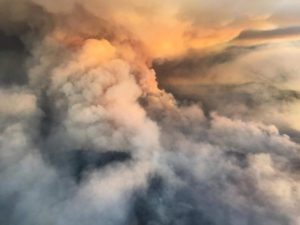 American Lung Association’s 2021 report ranks Medford air just above Los Angeles’
American Lung Association’s 2021 report ranks Medford air just above Los Angeles’
The air we breathe sustains our health – or degrades it. When we think of air pollution, we may think of crowded highways in Los Angeles, billowing smoke from a coal-fired power plant, or a haze of ozone that lingers. But did you know that Medford ranks next in line for the most polluted cities after L.A.?
In the American Lung Association’s recent report, “State of the Air 2021,” Medford-Grants Pass ranked number five in their cities listed for annual particulate matter (PM2.5) concentrations. Jackson County sat at number seven for worst Annual PM when ranked by counties with published data.
As we’ve all experienced, particulates in the air move, ubiquitously and across huge areas. I saw it 41 years ago in 1980, when Mt. St. Helens dumped ash on our family campsite on the Oregon Coast, some 200 miles away from the active volcano.
In the same way, smoke travels and settles across hundreds of miles.
So why is it that air pollution does not serve as the great equalizer, where everyone feels the effects the same? Why is air pollution (and Climate Change) at the top of the list for those fighting for justice, and against environmental racism?
Environmental racism can be broadly described as the “disproportionate impact of environmental hazards on people of color.” Environmental Justice has an evolving definition but encompasses elements of history, culture, class, and science into proactive campaigns led by those most impacted. Readily available documentation proves the gross inequity between predominantly white areas and communities of color when it comes to environmental hazards.
Back in 2012, I joined a coalition of groups to hold Bank of America accountable for its funding of fossil fuels in Houston Texas.That’s where I really learned how racism and pollution worked hand in hand. Big oil and gas companies acted in concert with city planners and banks to condemn communities of color to toxic air and dangerous conditions, verified in annual reports on the subject. While campaigns for justice maintain momentum, companies continue to propose new infrastructure and documentation of heightened levels of exposure continue.
Like planners in Houston, disregard for public health in favor of industry interests has created disproportionate impacts on the health of Latinx communities, many of whom work outside or lost homes in recent fires in the Rogue Valley. In our case, residents of Southern Oregon and Northern California now must pay the price for decisions made by federal land managers influenced by industrial logging interests, including the century-long strategy of 100 percent suppression of forest fires.
Climate Change brings with it warmer temperatures and drier conditions in the Klamath-Siskiyou bioregion, so much so that our fire-dependent ecosystem runs the risk of continued, extreme fire events. Now, the valiant efforts of restoration foresters, who facilitate controlled burns to lessen the severity of anticipated events, inadvertently create air pollution in our region, even in early spring. Mitigations like these are critical, but decision-makers now must wake up to the lessons learned and not repeat them.
Indigenous land managers in our region know how to maintain a healthy relationship with fire and evidence suggests their use of prescribed burns prevented the worst fires, while preserving wildlife habitat.
Working together, academic scientists and practitioners of Traditional Ecological Knowledge can provide effective solutions to the global climate crisis. Similarly, those most impacted can and should lead the charge of identifying priorities both locally and at all levels of governance.
To learn more about current events in our region related to air pollution and fire resilience, we encourage you to tune into the “Fire Town Hall: Focus on Phoenix,” Thursday, April 29 at 6 p.m.


